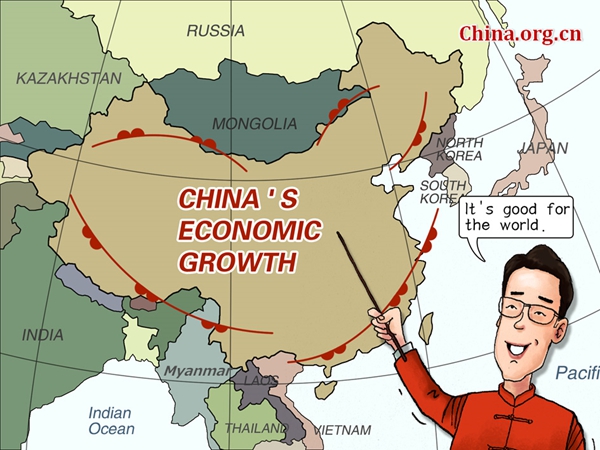Chinese economy still the ballast for global growth
- By Zhang Jingwei
 0 Comment(s)
0 Comment(s) Print
Print E-mail China.org.cn, July 5, 2016
E-mail China.org.cn, July 5, 2016
|
|
|
Warm current [By Zhai Haijun/China.org.cn] |
Half of 2016 has passed. How will the global economy develop? The IMF chief Christine Lagarde warned of "new mediocre" risk looming for global growth.
The "New mediocre" situation isn't as frightening as the possible "black swans" scenario. The Brexit wasn't a "black swan," nor will Donald Trump becoming the U.S. president, as these risks were already anticipated.
For China, a country deeply involved in globalization, the fluctuation in the global market will certainly impact China's economy, although the impacts will be mainly felt in the stock market, foreign exchange market, and trade.
Luckily, China's stock market hasn't been fully docked with the global financial market and China is blessed to have enough foreign reserves to ensure the yuan's exchange rate, which means that China is capable of fending off risks from the international market. In addition, China's internal market is big enough.
Therefore, although the global economic outlook may not seem cheerful, it can't be too bad either. However, problems faced by the global economy, especially major economies, still deserve attention.
First, China's economy hasn't walked out of what is called the "new normal" characterized by an L-shape trend. It means China's economic restructuring (i.e. supply-side reform) still has a long way to go.
Second, the U.S. recovery hasn't reached expectations, and the Federal Reserve remains motionless in raising the interest rate. Last month, the IMF once again brought down its expectation on the U.S. annual growth rate, and put it at 2.2 percent, still 0.2 percentage points lower than the agency's April speculation.
Third, Japan and the Eurozone both failed to achieve their growth targets despite implementing more radical, more obstinate and relaxed monetary policies (a negative interest rate). Japan delayed the reform on sales tax once again, which was interpreted as Abenomics walking toward a dead end while the ECB's negative interest rate policy faces many controversies and ineffective implementation.
Fourth, the Brexit disrupted the global market, in terms of the global stock markets, foreign exchange markets, and trade channels. Although the impact won't last long, it will still disrupt global economic trends.
Fifth, the emerging markets performed poorly. Brazil and Russia were affected by low global prices of energy and resources, and their economies remain disadvantaged. India's growth could at most be called at a medium-to-high rate, so that it can hardly be a locomotive for global recovery.
To resolve the global new mediocrity, monetary policies, especially the negative interest rate policies, will not be effective enough. Instead, systematic reforms could be the way out.
The U.S. exemplifies stability while China serves as role model for reform. The China-U.S. "dual core engine" is still the hope for global recovery.
The Federal Reserve's prudential, gradual rate hikes reflected the sluggish U.S. economic recovery, whose continuation lacks momentum. But even so, the U.S. economy is nonetheless en route of recovery. Latest statistics show that the U.S. manufacturing sector expanded at the highest speed in the past 16 months in June, the fourth month in a row for such an expansion.
The gradually stabilizing U.S. economy helps enhance the global market confidence, although it may trigger the Federal Reserve to raise interest rates, draining off the capital in the rest of the global market, especially the emerging markets. The Federal Reserve only bides its time during the H1 of the year, evident of its concern for market risks elsewhere, such as China's unstable stock market as well as the potential Brexit. But U.S. economic recovery and its central bank's gradual rate hikes will do more good than harm to the world.
The "new normal" of China's economy is characterized by an L-shaped development curve, meaning that China will have a slowdown in growth. But even so, the Chinese economy remains a ballast for global growth.
First, the L-shaped curve is a voluntary decision from the Chinese government, as China is unable to burn money endlessly to buy growth, and henceforth a slowdown is an inevitable choice. The slowdown also prompts China to initiate the supply-side reform to resolve the old, structural problems and in turn, realize a structural upgrade. Although the slowdown may lead to slower growth, it may consolidate China's economy and make it a more sustainable and more stable engine for global growth.
Second, despite the downward pressure, the Chinese economy still contributes a great amount to global growth. In the latest Summer Davos, Minister of National Development and Reform Commission Xu Shaoshi stressed that China contributed 25 percent to the world economic increment. In the post-crisis era, China's economy still outperforms.
Third, despite the voluntary slowdown, China managed to maintain its growth rate at 6.7 percent for Q1 of this year. It still dwarfs many others in the world. More importantly, China's supply-side reform and the "Belt and Road" initiative will benefit the Chinese economy from both internal and external perspectives. The two strategies expand global capacity and provide financial support, which could be fairly referred to as China's new contribution to the global market.
That having been said, however, the U.S. presidential election may be a risk as Trump, who champions nationalism and anti-globalization, may affect the Federal Reserve's rate hikes and the global economy in the larger picture.
The author is a researcher from the Charhar Institute.
The article was translated by Chen Boyuan. Its original version was published in Chinese.
Opinion articles reflect the views of their authors, not necessarily those of China.org.cn.







Go to Forum >>0 Comment(s)